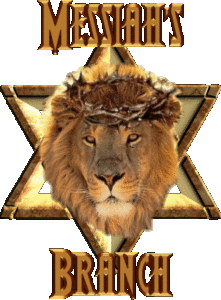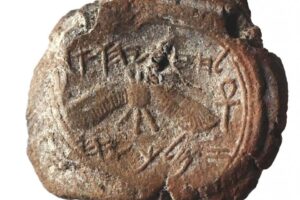Branch Prophecies of Isaiah, Jeremiah & Zechariah
Three Hebrew prophets over the span of 200 years – Isaiah, Jeremiah, and Zechariah – had one particular prophecy in common.[1] All foretold of the coming “Branch” or “Shoot.”
Generations after King David’s reign, some 700 years before Jesus of Nazareth was born, the remnants of Israel were in a downward death spiral. Despite many warnings from numerous prophets for centuries, the Hebrews and their kings still failed to abide by their contractual Covenant made with God at Mt. Sinai.[2]

Renowned by both Judaism and Christianity as the foremost prophet of God, Isaiah, warned Kings Ahaz and Hezekiah of the consequences their nation faced for disregarding God. Isaiah prophesied the “King of Babylon” would take away their descendants to serve as eunuchs in his palace.[3]
Warnings also came with good tidings when Isaiah prophesied about the coming future Messiah.[4] Isaiah foretold of a “Branch” or “Shoot” would grow or “sprout” from the root of Jesse:[5]
Is 11:1-2 “There shall come forth a Rod from the stem of Jesse, And a Branch shall grow out of his roots. The Spirit of the LORD shall rest upon Him, The Spirit of wisdom and understanding, The Spirit of counsel and might, The Spirit of knowledge and of the fear of the LORD.”(NKJV)
Is 11:10 “And it shall come to pass on that day, that the root of Jesse, which stands as a banner for peoples, to him shall the nations inquire, and his peace shall be [with] honor.”(Complete Jewish Bible)
Prophet Jeremiah also added a bad news/good news scenario, first prophesying the secession of sitting kings in the House of David would end with Jeconiah aka Jehoiachin.[6] Amidst the doom and gloom forecast, Jeremiah twice foretold good news prophesying God would raise up a King in the lineage of King David who will be a righteous judge:
Jer 23:5 “”Behold, the days are coming,” says the LORD, “That I will raise to David a Branch of righteousness; A King shall reign and prosper, And execute judgment and righteousness in the earth…””(NKJV)
Jer 33:15 “‘In those days and at that time I will cause to grow up to David A Branch of righteousness; He shall execute judgment and righteousness in the earth…’” (NKJV)
Continued defiance by the Hebrews led to the fulfillment of Isaiah’s and Jeremiah’s judgement prophecies at the hands of Babylon. Nebuchadnezzar’s destruction of Jerusalem and capture of some of Israel’s finest are documented in the Book of Daniel.[7]
One of Isaiah’s prophecies was fulfilled two centuries later when a king named “Cyrus” bloodlessly conquered Babylon and took control of the Hebrew captives eventually ending the Babylonian captivity.[8] Soon after capturing Babylon, Cyrus issued a decree allowing Jerusalem and the Temple to be rebuilt:[9]
Ezra 1:2 ‘The Lord God of the heavens has given to me all the kingdoms of the earth. He has appointed me to build for him a temple in Jerusalem in Judah. May the Lord your God energize you who belong to his people, so you may be able to go back there!”(NET)
King Darius honored Cyrus’ decree and then another was issued by Darius’ successor, King Artaxerxes. Supporting decrees were required due to enemies of the Hebrews thwarting efforts to rebuild Jerusalem and the Temple.[10]
Prophet Zachariah prophesied during the reign of Darius in several visions. In a fourth vision, Joshua the Priest stood before the angel of the LORD along with Satan who was there to accuse him.[11]
Satan was rebuked by God and Joshua was given fine new clothes.[12] In the vision, the angel of the Lord delivered God’s message speaking directly to the high Priest:[13]
Zech 3:8 “‘Now listen, Joshua the high priest, you and your friends who are sitting in front of you—indeed they are men who are a symbol, for behold, I am going to bring in My servant the Branch.’” (NASB)
Jewish sage Rabbi Maimonides identified “My servant the Branch” as the Messiah.[15] Some two hundred years earlier in the parashah of Isaiah 52-53, “My Servant” is described being subjected to unusual cruelties consistent with a Roman crucifixion described by the Gospels.
Narrating his eighth vision, Zechariah received instructions from God to choose people from among the exiles to make a crown of gold and silver, then set the symbolic crown upon the head of Joshua, the high Priest. Zechariah was then directed to deliver this message to the Priest:[14]
Zech 6:12-13 “…‘Thus says the LORD of hosts, saying: “Behold, the Man whose name is the BRANCH! From His place He shall branch out, And He shall build the temple of the LORD; Yes, He shall build the temple of the LORD. He shall bear the glory, And shall sit and rule on His throne; So He shall be a priest on His throne, And the counsel of peace shall be between them both.”’” (NKJV)
God said through Zechariah’s oracle prophecy the Branch would sit upon the throne as both King and priest who would build the Temple. Jewish sage Rabbi Rashi commented he believed the prophecy was in reference to Zerubbabel although the Rabbi did acknowledge others viewed the prophecy as referring to the Messiah.[16]
Prophecies from Isaiah before the Babylonian captivity, Jeremiah during the Babylonian captivity and Zechariah after the Babylonian captivity point to a future figure called “the Branch.” The foretold Branch would have the characteristics of being wise and understanding; come from the lineage of David; and righteously judge the earth with a counsel of peace as a Servant of God.
What are the odds that Jesus of Nazareth is the fulfillment of the Branch prophecies?
Updated May 19, 2025.
This work is licensed under a Creative Commons Attribution-NonCommercial-NoDerivatives 4.0 International License.
REFERENCES:
[1] “Isaiah.” Encyclopædia Britannica. 2019. <https://www.britannica.com/biography/Isaiah> “Isaiah.” New World Encyclopedia. 2018. <https://www.newworldencyclopedia.org/entry/Isaiah> “Jeremiah.” Encyclopædia Britannica. 2019. <https://www.britannica.com/biography/Jeremiah-Hebrew-prophet> “Jeremiah.” New World Encyclopedia. 2018. <http://www.newworldencyclopedia.org/entry/Jeremiah> “Zechariah.” Encyclopædia Britannica. 2019. <https://www.britannica.com/topic/biblical-literature/The-last-six-minor-prophets#ref597798> “Zechariah, Book of.” New World Encyclopedia. 2013. <http://www.newworldencyclopedia.org/entry/Zechariah,_Book_of>
[2] Exodus 24:3-8. CR Deuteronomy 29.
[3] Isaiah 39:7. “ben.” Netbible.org. <http://classic.net.bible.org/strong.php?id=01121> Messiah’s Branch. Prophetic Information Ministries. image. n.d. <http://www.propheticinformationministries.com/Messichs%20Branch.gif> CR Daniel 1:1-4.
[4] I Chronicles 2:11-13; 2 Ruth 4:17.
[5] The Complete Jewish Bible – with Rashi Commentary. Rashi commentary on Isaiah 11:1. <https://www.chabad.org/library/bible_cdo/aid/16210/showrashi/true> CR Isaiah 9:6-7; 11:10. CR 1 Chronicles 2:12-15, 3:16-18; Ruth 4:21-22; Matthew 1:5-16; Luke 2:4; 23-31. Ryrie. “Introduction to the Book of Isaiah.”
[6] 2 Kings 24:6, 8, 12, 15; 25:27, 29; 1 Chronicles 3:16, 17; 24:15; 2 Chronicles 36:9, 22; Esther 2:6; Ezra 2:1; Jeremiah 22:24-30, 24:1, 10-16, 52:27-33; 27:20; 28:4; 29:2, 52:31, 33; Esther 2:6; 2 Kings 24:6, 8, 12, 14-15; 25:27, 29. CR Ezekiel 1:1-3.
[7] Daniel 1:1-4.
[8] Isaiah 44:28; 45:1, 13.
[9] CR 2 Chronicles 36:23; Isaiah 44:28, 45:1, 13. CR Ezra 2:1-2; Nehemiah 7:6; Isaiah 41:2-3, 25, 27; 43:9, 21; 48:14-15. Josephus, Flavius. Antiquities of the Jews. Book XI, Chapters I.1-2. Trans. and commentary. William Whitson. The Complete Works of Josephus. 1850. <http://books.google.com/books?id=e0dAAAAAMAAJ&printsec=frontcover&source=gbs_ge_summary_r&cad=0#v=onepage&q&f=false>
[10] Ezra 6:14; 7:12-20; Ezekiel 1:2-3, 6:7,12. “Darius I.” Encyclopædia Britannica. 2019. <https://www.britannica.com/biography/Darius-I> Josephus. Antiquities. Book XI, Chapters III.8, IV.1-2. Mark, Joshua J. “Artaxerxes I.” World History Encyclopedia. March 3, 2020. <https://www.worldhistory.org/Artaxerxes_I>
[11] Zechariah 1:1. NET, NIV. “Darius I.” Encyclopædia Britannica.
[12] Zechariah 3.
[13] Plaut, Gunther. “Haggai, Zechariah and Malachi: Back in the Land.” MyJewishLearning.com. n.d. <http://www.myjewishlearning.com/texts/Bible/Prophets/Latter_Prophets/The_12_Minor_Prophets/Haggai_Zechariah_Malachi.shtml>
[14] I Chronicles 3:17-19; Haggai 1:1, 12, 14; 2:2, 23; Ezra 3:8.
[15] Maimonides, “Letter to the South (Yemen)”. p374. Neubauer and Driver. The Fifty-third Chapter of Isaiah According to the Jewish Interpreters. <https://books.google.com/books?id=YxdbAAAAQAAJ&pg=PP1&hl=en#v=onepage&q=advent&f=false>
[16] The Complete Jewish Bible – with Rashi Commentary. Rashi commentary on Zechariah 6:12. <https://www.chabad.org/library/bible_cdo/aid/16210/showrashi/true>

